I’m a football fan, both the Canadian and American versions, and so I’ve followed the Colin Kaepernick saga over the last few years.
For the uninitiated, Kaepernick was a quarterback, the most important position in his sport, who took to kneeling during the American anthem before football games. He did this as a protest against police brutality in the U.S., particularly towards minorities. Needless to say, his action was polarizing.
For the last two years, Kaepernick has not had an NFL team to play for, perhaps being deemed unsignable because of his accompanying baggage. His decision to sacrifice his career for a larger cause inspired a Nike campaign this fall headlined by these words: “Believe in something, even if it means sacrificing everything.”
That campaign, as controversial a choice as Kaepernick was, has resulted in record stock prices and huge sales revenues for Nike.
On the other side of the coin, this is the month we honour the veterans who bravely defended our country in wars past.
Everywhere you go this month on the North Shore, you will see poppies pinned to jackets, schools will hold assemblies, moments of silence will be observed. Events like the Battle of Vimy Ridge, the Invasion of Normandy, and the Korean War will be recounted.
The valiant efforts of men and women who were willing to sacrifice their lives for the safety and protection of our country will be centre stage.
Interestingly, it has often been people who resonate most strongly with the second paragraph (people who hold in high regard the military, the police, and others who serve to protect and defend us) who have been most opposed to the subject matter of the first paragraph.
Kaepernick’s protest, and the resultant attention, appears incredibly disrespectful towards those who have sacrificed much more. But let’s put these differences to the side just for a moment, regardless of our political persuasion or our position on various social issues.
There is a common undercurrent to these two paragraphs that reveals a stunning commonality. Here it is: we, as humans, find sacrifice to be inherently and deeply compelling.
The thought that someone would lay down their life, or their career, or their own well-being for some greater cause is beautiful. The thought that someone would value the lives of others more than their own is nearly the definition of the word heroic. No matter how much our culture increasingly prioritizes self-fulfillment, the beauty of self-sacrifice hasn’t gone anywhere.
The centre of the Christian message lies right here. The early Christian leader Paul wrote these words: “very rarely will anyone die for a righteous person, though for a good person someone might possibly dare to die.
But God demonstrates his own love for us in this: while we were still sinners, Christ died for us.” (Romans 5:7-8) A couple of verses later, Paul even says that we had made ourselves enemies of God through our rejection of Him, yet Jesus died for us.
There is beauty in a man laying down his career for a larger cause.
There is honour and valour in someone laying down their life for their family and country. How much more when someone lays down his life for his enemies, when someone dies to reconcile the whole world, not just their nation or ethnic group? ■
Craig Thiessen is the lead pastor of The Bridge Church, which meets Sundays, 10 a.m., at the BlueShore Centre at CapU. The church hopes to begin construction on a new home at 1384 Deep Cove Rd. within the next year.



